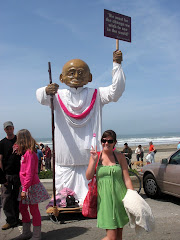In any given class, I may hear a student say, “Ordination is such a long process and I feel as though I can’t express what I really believe for fear that my committee/bishop/elder will not agree.” “I cannot be ordained in my tradition because I am a woman and women can’t be priests.” “My denomination would never ordain me because I am gay.” “I don’t have a definitive ‘call’ to a local church, so ordination is out of the question.”
And each week, while I sympathize with my different students, my inner response is the same. In my mind and heart, I think, “and that’s precisely why I am a Baptist.” The irony is that you could hear these exact same complaints uttered from the mouth of a Baptist, as well. Baptists, like the GTU, cast a rather wide religious net. What one Baptist church deems holy, another regards as profane. One Baptist’s soap box is another Baptist’s fear.
Embedded in our core Baptist principles are the distinctive qualities of local church autonomy and liberty of conscience. Therefore, there is NO convention, or priest, or elder, or creed that can dictate what an individual church or person may believe. Sure, we acknowledge that scripture is central to our faith…but we each interpret scripture quite differently. Each Baptist church is different, but I am fairly certain that none of the former complaints would be uttered by an individual seeking ordination at the church where I serve as Associate Pastor of Arts and Education. At Shell Ridge, we are uniquely and distinctly Baptist, affiliated with American Baptists and active in the Association of Welcoming and Affirming Baptists, the Alliance of Baptists, and the Baptist Peace Fellowship. We are Baptists…and so are many other churches which disagree with most of the issues upon which we stand.
Yet, amidst these soapboxes, complaints, commonalities, and differences, through the New Baptist Covenant, Baptist churches are meeting and praying and hoping that somehow, no matter our interpretations of scripture or political views, that we can stand in one accord to agree that poverty, justice, war, and racism are moral issues.
I, like the students at the GTU, have my fair share of complaints about my religious tradition, but it is because of liberty of conscience and local church autonomy that you will always hear me say proudly, “Now THAT’S why I’m a Baptist!” In the tradition I claim as my own, and in the tradition where I am ordained, I have a choice and I choose Baptist...freedom...and justice.
